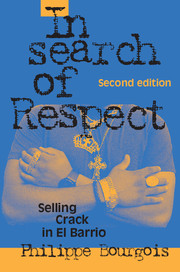Book contents
- Frontmatter
- Contents
- Acknowledgments
- Preface to the 2003 Second Edition
- Introduction
- 1 Violating Apartheid in the United States
- 2 A Street History of El Barrio
- 3 Crackhouse Management: Addiction, Discipline, and Dignity
- 4 “Goin Legit”: Disrespect and Resistance at Work
- 5 School Days: Learning to be a Better Criminal
- 6 Redrawing the Gender Line on the Street
- 7 Families and Children in Pain
- 8 Vulnerable Fathers
- 9 Conclusion
- Epilogue
- Epilogue 2003
- Notes
- Bibliography
- Index
- Other books in the series
4 - “Goin Legit”: Disrespect and Resistance at Work
Published online by Cambridge University Press: 05 June 2014
- Frontmatter
- Contents
- Acknowledgments
- Preface to the 2003 Second Edition
- Introduction
- 1 Violating Apartheid in the United States
- 2 A Street History of El Barrio
- 3 Crackhouse Management: Addiction, Discipline, and Dignity
- 4 “Goin Legit”: Disrespect and Resistance at Work
- 5 School Days: Learning to be a Better Criminal
- 6 Redrawing the Gender Line on the Street
- 7 Families and Children in Pain
- 8 Vulnerable Fathers
- 9 Conclusion
- Epilogue
- Epilogue 2003
- Notes
- Bibliography
- Index
- Other books in the series
Summary
I really wanna work legal.
PrimoEveryone in Ray's network – including Ray himself – has had extensive experience working honestly. Most entered the legal labor market at exceptionally young ages. By the time they were twelve, they were bagging and delivering groceries at the supermarket for tips, stocking beer off the books in local bodegas, or running errands. Before reaching twenty-one years of age, however, virtually none had fulfilled their early childhood dreams of finding stable, well-paid legal work.
The problem is structural, as outlined briefly in Chapter 2: From the 1950s through the 1980s second-generation inner-city Puerto Ricans were trapped in the most vulnerable niche of a factory-based economy that was rapidly being replaced by service industries. Between 1950 and 1990, the proportion of factory jobs in New York City decreased approximately threefold at the same time that service sector jobs doubled. The Department of City Planning calculates that over 800,000 industrial jobs were lost from the 1960s through the early 1990s, while the total number of jobs of all categories remained more or less constant at 3.5 million.
Economists and sociologists have documented statistically that the restructuring of the U.S. economy around service jobs has resulted in unemployment, income reduction, weaker unions, and dramatic erosions in worker's benefits at the entry level. Few scholars, however, have noted the cultural dislocations of the new service economy. These cultural clashes have been most pronounced in the office-work service jobs that have multiplied because of the dramatic expansion of the finance, real estate, and insurance (FIRE) sector in New York City.
- Type
- Chapter
- Information
- In Search of RespectSelling Crack in El Barrio, pp. 114 - 173Publisher: Cambridge University PressPrint publication year: 2002



